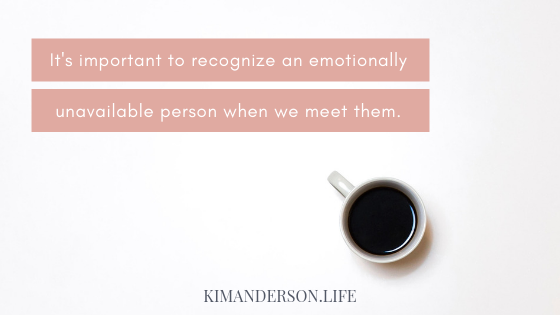Dealing With Emotionally Unavailable People
Today I am writing to my single ladies. Those of you who are searching for the right relationship. You are still looking for “Mr. Right” . . . but keep coming up empty. Today’s dating world looks a lot like the Bachelor/Bachelorette and scouring online dating apps like Match, Tinder, and Coffee Meets Bagel. You could say the dating pool has become pretty murky. The waters are unclear, and they just keep getting more and more confusing. It’s difficult to know when someone is in it for the right reasons, or if they are really emotionally available to begin with. (And truly, we all deal with emotionally unavailable people, whether we are in a relationship or not, so this can apply to anyone.)
Relationships with withdrawn or unavailable individuals can impact our self-esteem as we grapple with relationship dynamics and trying to decode another’s behavior. Time is truly precious and you don’t need to waste it on the wrong person. So it’s important to recognize an emotionally unavailable person when we meet them. Here are some traits to look out for when you’re dipping your toes in that murky dating pool:
1. Lack of Commitment
He can be charming, engaging, and handsome, but for some reason, he has never really been in a long-term relationship—and he’s 45. Perhaps he just doesn’t have the ability to stay in it for the long haul. The inability to commit is a red flag that comes with a strong warning.
2. A Critical Lens of Perfectionism
He uses perfectionism to identify flaws in you and others as a tool to keep people at a distance. If he can zero in on the flaws of others, he can keep himself from feeling the sting of being rejected first. It’s much easier to be the one that points out all of the ways a relationship would never work out, than to feel the vulnerability of intimacy and the possibility of rejection.
3. Rigidity or Lack of Flexibility
In order to be in healthy relationship, compromise is essential. Flexibility is a crucial component of “adulting.” Children are born with—and grow out of—a rigid and self-absorbed mindset. Sadly, some adults never get there.
4. Secrecy
He likes to keep his worlds private and separate. He has family and friends that he interacts with but never brings you around to meet them. He’s sneaky, lies about his whereabouts, or just simply ignores you from time to time. Red flag.
5. Doesn’t Deal with Conflict
Instead of working through conflict, which is a natural part of relationships, the emotionally unavailable person just ignores it. They either shut it down with anger, or they put their head in the sand and pretend it doesn’t exist. More often than not, it can leave you feeling like your feelings don’t matter.
6. Addictive Behaviors
Those that are emotionally unavailable can demonstrate addictive behaviors. Drinking, drugs, porn, gambling, and binging are all examples of coping strategies people can use to deal with deep feelings of shame or inadequacy. Sadly, the addictive behaviors will always take first place in their lives.
7. Unable to Consider Another Perspective
Emotionally unavailable people are unable to consider how someone else might be feeling. Empathy is a difficult emotion for them. And typically, emotionally unavailable people have a difficult time identifying their own needs, which makes it difficult for them to consider yours.
But just because someone is emotionally unavailable doesn’t mean they are a horrible person. They are likely cutting off their feelings as a way of protecting themselves. Somewhere along the way, they learned that protecting themselves with armor (which shows up as emotional distance) is the only way they can survive. The pain of previous experiences is just too much to bear. Vulnerability is too scary and unpredictable.
Their lack of availability could be a subconscious attempt to protect themselves from adverse childhood experience or trauma. Other times, distancers just don’t have a good model for what it looks like to be emotionally intimate. Perhaps they grew up in a family system that just didn’t go beyond the surface. Maybe for them, saying “I love you” was not the norm. Hugs and cuddles were viewed as inappropriate.
While it’s possible for an emotionally unavailable person to change, it’s not likely going to happen on their own. If you are beginning a new relationship with someone that appears to be emotionally distant, now is your chance to assess if you will ever be able to get your needs met.
If you are already committed to someone and find yourself here, consider working with a therapist who specializes in Emotionally Focused Therapy (EFT) (CLICK HERE TO SEARCH FOR AN EFT PROVIDER IN YOUR AREA). EFT therapy is a powerful way to bring the distancer back into the dance, so both of you feel safe and connected. I hope you can see just how valuable you (and your time) is as you wade those murky dating waters!


